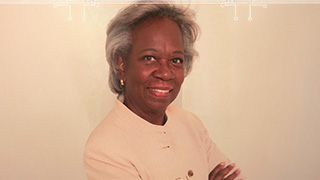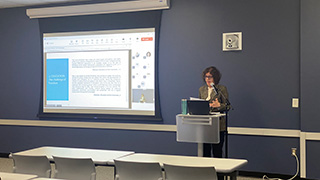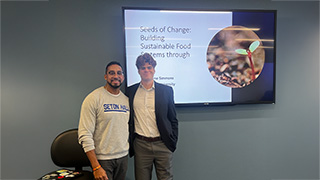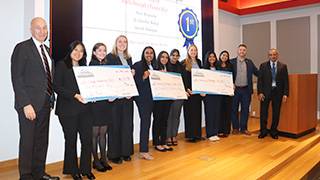Healthcare Evolution and Universities' Role Discussed at the 4th Digital Health Symposium During the United Nations General Assembly Week
Friday, September 27, 2024
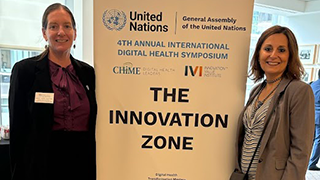
Provost and Senior Executive Vice President Katia Passerini, Ph.D., and Assistant Provost and Dean of Continuing Education and Professional Studies Mary Kate Naatus, Ph.D.
The 79th session of the United Nations General Assembly (UNGA) took place in New York City on September 22–27, 2024, while several parallel meetings occurred all over mid-town, bringing together stakeholders joined by a common interest: accomplishing the Sustainable Development Goals (SDGs). The 4th Digital Health Symposium, held at the Northwell Health Center in collaboration with many healthcare experts from academia, industry and governmental organizations, convened in a three-day conference that opened at Northwell and concluded at Fordham University.
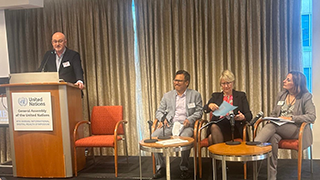
President Eeva Leinonen, Ph.D., Maynooth University; Provost and Senior Executive Vice President Katia Passerini, Ph.D., Seton Hall University; and Vice Chancellor Dr. Mangal Rawal, the Academy of Health Sciences in Nepal
Katia Passerini, Ph.D., provost and senior executive vice president of Seton Hall University, was invited to attend and participate in panel presentations and dynamic fireside chats alongside Eeva Leinonen, president of Maynooth University (Ireland), Hani Eskander, head of Digital Services Division at the International Telecommunication Union (ITU), Ryl Jensen, chief executive officer – Digital Health Association, (New Zealand) and Dr. Mangal Rawal, vice chancellor, the Academy of Health Sciences (Nepal). Passerini discussed the critical role of education in driving digital healthcare transformation and how academic institutions, like Seton Hall, can lead in developing forward-thinking programs to shape the future of healthcare.
As digital healthcare continues to evolve, the need for skilled professionals who can navigate technology, data and medicine and collaborate across sectors is more urgent than ever. The discussion covered how universities can meet this demand by offering specialized master’s programs in digital health, combining interdisciplinary coursework in AI, telemedicine, health informatics and leadership. These programs aim to prepare the next generation of healthcare leaders to manage the growing complexities of digital health systems and drive innovation in care delivery.
Seton Hall University offers an online Master in Healthcare Administration (MHA) with a digital health focus through its School of Health and Medical Sciences. The program includes coursework in digital health, telemedicine and health informatics, preparing students to lead healthcare organizations in the digital age. The curriculum integrates real-world applications of healthcare technology with management and policy education. Seton Hall also offers clinical training opportunities through its graduate nursing programs in the College of Nursing, providing students with hands-on training in the use of digital health tools, such as EHR systems and mobile health technologies, ensuring graduates are equipped for leadership roles in the healthcare industry.
The conference also covered the global implications of digital health, emphasizing how essential it is to integrate emerging technologies like artificial intelligence (AI), machine learning and remote patient monitoring into both healthcare practice and education. These innovations hold the potential to reshape healthcare by making it more accessible, personalized and efficient, especially in under-resourced areas. Examples from all over the world, including keynote speeches from Dr. Rasu Shrestha, EVP/chief innovation and commercialization officer, advocate health, covered how healthcare innovation systems are emerging in the South of the U.S., specifically through collaboration between the private and academic sectors (i.g. Wake Forest School of Medicine and Advocate Health).
A significant portion of the discussion revolved around the concept of leadership in digital health. With the growing integration of digital tools into healthcare systems, strong leadership is essential to ensure these technologies are implemented effectively, ethically and equitably. Passerini highlighted Seton Hall’s commitment to fostering such leadership through its programs, emphasizing the importance of equipping students with technical skills and a deep understanding of health policy, ethics and governance.
Eskander provided a global perspective, discussing the critical role of telecommunications infrastructure in supporting digital health initiatives. He highlighted ITU’s efforts to bridge the digital divide, particularly in low and middle income countries where access to digital health services remains limited.
Professor Martin Curley, the conference leader, explained the Stay Left, Shift Left 10X framework, which promotes early, preventative and proactive healthcare interventions through digital health tools. This framework not only reduces the strain on healthcare systems but also empowers patients to take control of their health through accessible technology. The role of education in advancing this framework is pivotal, as universities can prepare students to develop and implement innovative digital health solutions that improve patient outcomes and system efficiencies.
The conference theme underscored the importance of global collaboration between academic institutions, healthcare providers and technology companies to create scalable, sustainable digital health solutions. The future of healthcare will depend on the ability of educational institutions to adapt to the rapidly changing landscape of digital health. By fostering interdisciplinary collaboration and offering cutting-edge programs, universities like Seton Hall will play a key role in shaping a healthcare system that is more innovative, equitable, and sustainable.
Mary Kate Naatus, Ph.D., assistant provost and dean of Continuing Education and Professional Studies, also attended the conference to learn about the state of a growing sector that offers opportunities for professional development through access to stackable credentials and other flexible certification programs. These programs can give students from any background a leg up in a wide array of positions available in the health care sector in general, and digital health in particular.
Categories: Business, Education, Health and Medicine, Nation and World


